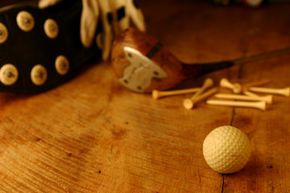Golf, or something very like it, has been around for a long time. The sport and its progenitors were depicted in Flemish woodcuts, mentioned in the novels of Emile Zola and even cropped up in the edicts of kings [source: McGrath]. Yet, its origins remain as foggy as a morning tee time on the Forth estuary.
Whether you regard golf as the epitome of Zen mind or, as Mark Twain put it, "a good walk spoiled," you've probably wondered where and how such a peculiar pastime originated. Who would devise a sport that "consists of putting little balls into little holes with instruments very ill adapted to [the] purpose," as one Oxford tutor noted? And furthermore, who thought that an expanse of hummocky, pitted grassland would make an ideal setting for it?
Advertisement
The Scots, that's who.
Actually, the origins of golf are not quite that cut-and-dried. People across Europe have knocked balls around with sticks and clubs for centuries in various games, some of which have contributed to golf's lore and language. Exactly how much they added to the sport remains hotly debated among scholars, but a few matters seem settled. The word "golf," for example, is believed to come from the medieval Dutch word kolf, meaning "club;" and "tee" most likely derives from tuitje, a small mound upon which a ball was placed in the Belgian game chole (a kind of long-distance croquet).
None of these other games is quite the same as the golf we know, however. For that, we have to thank Scotland, where they've been smacking balls for at least 700 years.
Read on as we go down the rabbit hole to find golf's origins.
Advertisement

